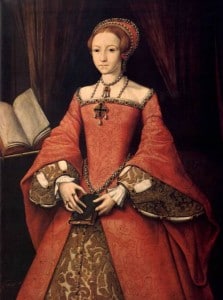
On 31st July 1544 ten year old Elizabeth, daughter of Henry VIII and Anne Boleyn, wrote a letter to her stepmother, Catherine Parr, who was acting as regent while Henry VIII was in France.
Why do I call this letter incredible? Well, because not only is it beautiful to look at, being written in a lovely itallic hand, but it was also written in Italian. Click here to see a photo of the original, which was damaged in the 1742 fire in Sir Robert Cotton’s library of manuscripts at Ashburnam House. I love her “z”s! By the way, it is the earliest surviving letter we have written by Elizabeth I.
Here is a translation from Italian to English:
“Inimical fortune, envious of all good and ever revolving human affairs, has deprived me for a whole year of your most illustrious presence, and, not thus content, has yet again robbed me of the same good; which thing would be intolerable to me, did I not hope to enjoy it very soon. And in this my exile I well know that the clemency of your highness has had as much care and solicitude for my health as the king’s majesty himself. By which thing I am not only bound to serve you, but also to revere you with filial love, since I understand that your most illustrious highness has not forgotten me every time you requested from you. For heretofore I have not dared to write to him. Wherefore I now humbly pray your most excellent highness, that, when you write to his majesty, you will condescend to recommend me to him, praying ever for his sweet benediction, and similarly entreating our Lord God to send him best success, and the obtaining of victory over his enemies, so that your highness and I may, as soon as possible, rejoice together with him on his happy return. No less pray I God, that He would preserve your most illustrious highness; to Whose grace, humbly kissing your hands, I offer and recommend myself.
From St. James’s this 31st July.
Your most obedient daughter, and most faithful servant, Elizabeth”
If you’re interested in reading Elizabeth I’s correspondence then you can find transcripts of her letters, along with prayers, speeches and poems, in Elizabeth I: Collected Works.
- ed. Everett Green, Mary Anne (1846) Letters of royal and illustrious ladies of Great Britain:
from the commencement of the twelfth century to the close of the reign of Queen Mary, Volume 3, p176-177